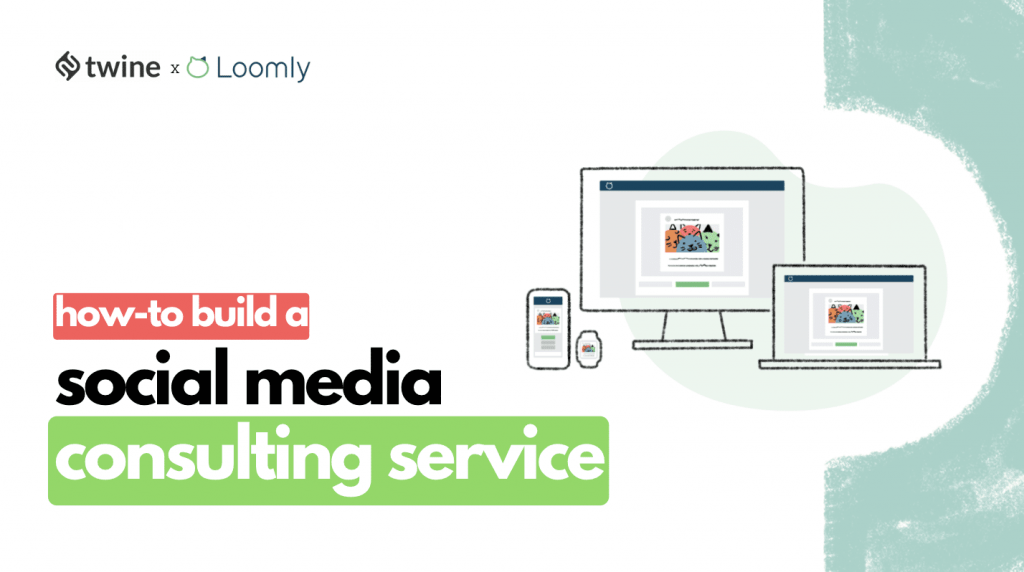
The pandemic accelerated digital transformation for businesses. Brands both large and small, whether ecommerce or social media, require more and more expertise, advice, and help to operate. Having a successful social media consulting service under your belt has never been more needed…
Hiring for digital marketing roles has grown nearly 33% year-over-year, and social media roles figure heavily:
- 74% – Social Media Marketing Manager
- 64% – Social Media Marketing Consultant
- 54% – Social Media Manager
- 31% – Social Media Marketing Specialist
- 29% – Social Media Strategist
- 28% – Social Media Coordinator
If you’ve been on the fence, it’s prime time to launch your social media consulting service or expand your current services to include social media.
Inside, you’ll learn:
- What a social media consultant does
- Whether you should start an agency or operate as a freelancer
- When it’s the right time to launch your social media consulting service
- How to launch your own social media consulting service
Let’s start!
What do Social Media Consultants do?
A better question is what don’t they do?
Social media consultants perform a variety of services depending on their expertise and their client’s requirements. For instance, a company might request a once-only social media training for their in-house team or a monthly retainer to manage all their social media campaigns.
The typical skills a social media manager or consultant needs include:
- Copywriting
- Photography & Videography
- Graphic design & animation
- Market research
- Reporting & analytics
- Best practices for each social platform
- Business and marketing strategy
- Competitive analysis
- Content & editorial planning
- And much more
While a lot is asked of social media marketers, most will specialize in a few areas. You don’t have to do it all, you just have to be clear with clients about your service offering!
Should You Start an Agency or Operate as a Freelancer?
Social media consultants can operate either as an agency or a freelancer – but which option is best?
Agency pros:
- Operating under a company name may give you more kudos and help you attract more prominent clients.
- It’s easier to transition from solo to a team while keeping the same agency branding.
- Operating as a limited liability company (LLC) protects your personal assets, such as your home, if a client decides to sue you.
Agency cons:
- Operating as a limited company entails different (stricter) tax rules, like company tax and employee tax.
Freelancer pros:
- Operating as a sole trader has simplified taxes.
- You can focus on building your reputation and brand.
Freelancer cons:
- It may be harder to attract investment as a freelancer compared to an agency.
If you’re just starting out, the overwhelming advice would be to start as a freelancer, then grow into your own agency. It’s the fastest, most effective, and least risky way to get started.
Gain a reputation. Build out your own brand, book of business, and portfolio. Once you’ve established yourself as an authority within your industry, then consider growing into a full agency.
When is the Right Time to Launch a Social Media Consulting Service?
There’s no right or wrong time to start your social media consulting service. It’s up to you and your goals. But, if there ever was a time to do it, it’s now. The pandemic has made businesses even more dependent on digital marketing and social media to reach customers, and this will only continue.
As we outlined earlier, social media is hard. It requires a ton of time, experience, and technical expertise that many marketers, let alone business owners, don’t have.
A word of caution: don’t launch until you’re confident you can craft and execute a full social media marketing plan. If you don’t feel confident that you’ll be able to clearly define deliverables and meet high client expectations, hold off until you’ve gotten more projects under your belt.
How to Launch Your Own Social Media Consulting Service
Follow these six steps to launch your own social media consulting service:
- Build and maintain your credibility
- Choose your niche
- Create a business plan
- Price and package your services
- Attract and win clients
- Track your progress
1. Building and maintaining your credibility
The first step starts before you launch your services and continually evolves as your business grows.
Without credibility, no one will hire you.
So how do you become credible?
Establish your own social media presence
First of all, you need to establish yourself on social media. You don’t have to be active on all the social networks, but you should definitely be active on those platforms you want to specialize in and where your prospective clients will be present. It’s your chance to convince prospects you know how to market on social media.
Also, remember to post consistently on your chosen platforms. Prospects will check your profiles and won’t want to see 3-week gaps where nothing was posted.
Build your website
In addition to social media, you’ll also want to consider building a website where you can showcase your talent, and eventually, the services you offer.
Aside from social media, prospective clients will check out your website. You don’t have to build a flashy website, just something that is clean and functional.
It’s also a place to house your case studies and testimonials – nothing beats social proof for establishing your credibility:
Consider adding relevant client testimonials from unpaid jobs (internships), side projects, and charity work when you’re just starting out.
Develop your skills
As a social media professional, you need to continually develop your skills to ensure you’re up to date on the latest trends and techniques. Make sure you understand the nitty-gritty details, including the terms of service, rules, promotions, and analytics for each social network.
Also, consider getting recognized qualifications that prove you have studied social media marketing.
Work on side projects
One way to build credibility is to start some social media consulting as a side project while you’re still in full-time employment. You can test the waters to see if you like working solo, and if all goes to plan, it lets you display client testimonials on your website before you launch full-time.
You can build a profile and start taking on projects through freelancer marketplaces such as Twine. They make it easy to build your portfolio and hone your skills.
Start networking and building connections
One activity you always need to be practicing is networking. You can start building your network long before you launch your consulting business. It will be far easier to launch if you already have an engaged audience.
Here are a few ways:
- Network with other social media consultants online – you’ll find there is a helpful community out there.
- Follow and engage with brands you’d like to work with – start building relationships.
- Attend social media events – virtual events to put faces to names and physical events to meet people in person.
- Build a powerful LinkedIn profile, connect with peers and clients, and engage in conversations.
- Join social media groups, focused on:
- The industry and niches you’re targeting, so you can contribute and demonstrate your social media skills and experience.
- Social media marketing, so you can network and get support from your peers.
2. Choosing your niche
Before you launch your social media consulting service, you’ll need to choose your niche. There are three ways you can niche-down.
Platforms
When you’re starting out, it’s a good idea to focus on one or two social media platforms rather than spreading yourself too thin. Remember, each platform has:
- Different algorithms
- Different audiences
- Different types of content
For example, LinkedIn and Snapchat are poles apart, so it wouldn’t make sense to cover both platforms. However, if you want to become a visual marketing expert, it makes sense to offer both Instagram and Pinterest services.
Industries
Next, you want to consider what industry or sector you want to work with.
Remember, different industries need different kinds of campaigns, even if they’re on the same platform. For instance, an ecommerce fashion retailer and a real estate agency will have different types of campaigns and content even if they both use Facebook Ads.
Focus on industries that suit your previous knowledge and skill set, so you don’t have to learn too much new information. Also, be mindful of choosing profitable industries rather than struggling ones, so you don’t have to worry about getting paid.
Services
Finally, you’ll need to decide what services you’ll specialize in. For example, you might choose to focus on organic social media rather than paid social media services.
You’ll have to stick to your guns, as clients will inevitably ask you for work beyond your scope of services. Pick your niche, communicate it clearly, and stick to it.
3. Creating a business plan
Planning is an essential step before you launch your consulting services.
Conduct research
When you’re creating your business plan, you’ll need to research:
- Current industry trends – to get a clear understanding of where things are standing.
- Target market – to check it’s healthy and viable.
- Competitors – to see what’s working and what isn’t.
- Skills – to check you have everything.
Decide on your structure: agency or solo
As mentioned earlier, you’ll need to decide on the structure of your business. There’s no right or wrong answer – just weigh up the pros and cons above.
Decide on your business name
Next, you’ll need to choose your business name, which essentially becomes your brand name, so it makes sense to take your time and get it right.
If you decide to operate as a freelancer, you could use your own name. However, if you build your brand around your name and then want to expand into an agency later, your name might not work.
Note: Any name you choose that isn’t your given name should be checked on the United States Patent and Trademark Office (USPTO) website to ensure it’s not already trademarked by someone else.
Taxes/Legalities/Accounting
Depending on the country and region you live in, you’ll have to obtain different licenses and certifications to run a legal business. Consider the following:
- Set up a business bank account to keep your funds separate.
- Register your business with the tax office.
- Find an accountant to help you with your taxes and financial planning.
- Hire a lawyer to help you establish legal contracts to use with your clients.
Work on your branding
We’ve already mentioned building a website and establishing your social media presence. Once you’ve chosen your business name and logo, you can circle back and make sure these online accounts all have your branding in terms of logo, colors, and fonts, so you start to build awareness with a unified impression.
Tools and processes
At this stage, you can also start planning what tools, processes, and workflows you’re going to use to make your business run smoothly.
For example, consider how you’ll manage clients from start to finish:
- Prospecting: How do you attract clients? How do they schedule a consultation with you?
- Proposal: How will you review and approve the proposal?
- Contract: Are you providing a contract? Is it easy to understand? How do clients sign it?
- Onboarding: How do you start working with a new client?
- Invoicing: How do you deliver invoices? How do you want to be paid? Is your client clear on payment terms and late fees?
Also, consider what tools you’ll need, such as:
- Social media management software
- Graphic design tools
- Analytics and reporting program
- Office apps, including email, word processing, and spreadsheets
- Video conferencing
- Project management tools
- Appointment scheduling software
- Invoicing software
4. Pricing and packaging your services
There are various ways that you can price and package your services. Let’s examine a few options.
Hourly/daily rate
An hourly or daily rate is ideal for an unknown variable, for example, mentoring, consulting, or training, that you bill as time is consumed. For example, you might agree to offer your social media consulting services for $50/hour.
Project-based rate
You can use a project-based or fixed rate when you provide bespoke services, like consultations, strategy sessions, audits, or training. You’ll need to have a good handle on how long a piece of work will take before you can feel confident charging per project.
For example, you could agree to complete a social media audit for a fixed sum of $500, regardless of how much time it takes you. Payment for project-based work is usually made in advance, at agreed milestones, 50% in advance, and 50% on completion, or on completion.
Monthly retainer
A monthly retainer is used when you agree to deliver regular recurring monthly services with payment on a set date each month. Retainers vary slightly, so you may agree to provide X hours per month or a fixed piece of work. For example, you agree to provide 20 hours per month to manage a client’s social media campaigns. Or, you might agree to deliver social media publishing and reporting for Facebook and Instagram.
Packaged services
By the time you get onto monthly retainers, you’re almost in packaged services territory. These are a set of services you provide every month for a fixed fee.
Pro Tip: Overdeliver. Whatever pricing and packaging strategy you choose, always overdeliver. You’ll establish a strong reputation that’ll help you get testimonials and referrals for future clients. Whatever you do, don’t overpromise!
5. Attracting and winning clients
Attracting and winning clients is probably the most challenging part of launching your business. Here are a few options to explore:
Work in an agency
Before launching your services, gain valuable experience by working for a social media agency:
- You get to know how an agency operates.
- You get to build your contacts and connections in the industry.
- You get to establish your credibility as a social media consultant.
Reach out to existing connections
If you’ve followed the earlier advice in step #1, you should now have an extensive network you can tap into. Even if the person or business you contact can’t use you, they might know of other people who can. You can’t underestimate the power of networking.
Use freelance marketplaces
When you’re starting out you can often find suitable work in freelance marketplaces like Twine. Make sure you’re balancing your time and working for a rate that’s fair for your work and skills.
Generate leads
If you’ve set up your website, then you can create a landing page to generate leads. You can do this way ahead of launching, so you have a waiting list of prospects to contact when you’re ready. Start a waitlist or share some free resources to build your email list.
Start local
One option when launching your services is to focus on local businesses. Now that pandemic restrictions have loosened, you can actually get out into your neighborhood and introduce yourself to companies, leave some brochures, and follow up with a call.
Also, if you’re going down the local path, get active in your local business community. For example, you could attend the Chamber of Commerce meetings to connect with businesses looking for social media consultants.
Word of mouth is always the best way to grow your business. It’s free and effective!
6. Tracking your progress
Once you’re up and running, you’ll need to track your progress.
Measure and adjust
First, you need to measure how your clients benefit from your social media services, according to what you offered. For example:
- Are their social media campaigns a success?
- Have you increased brand awareness?
- Have you trained their team as promised?
Bottom line: you need to prove that your clients are getting a return on their investment. Use tools like Loomly to track your marketing efforts and show them the results.
You’ll also need to track progress in your business as a whole:
- Are you meeting your objectives?
- Do you need to make any changes?
Remember, the digital landscape is always changing, so you’ll have to measure and adjust accordingly.
Ongoing development
One area not to forget is your ongoing personal development. It’s easy to become 100% booked on client work and forget that you need some time for yourself. Social media platforms are always changing, so keeping updated on the latest developments is a minimum. You’ll also want to stay abreast of industry trends and what your competitors are offering.
Grow your business
Once you’ve established your business, you’ll want to scale and grow accordingly. This is a great opportunity to find someone you can bounce ideas off of or learn from.
You’ll need to decide how you want to grow. For example, you could hire people so that you can serve more clients with your proven services. It may be prudent to hire freelancers to help you instead of hiring staff and having all the necessary overheads.
Wrapping Up
There’s no right or wrong time to launch your social media consulting service, but with the pandemic, there’s never been a greater need for qualified social media consultants to advise and help businesses through the digital marketing landscape.
Use the reminders in this blog to help you out as you follow these six steps to launch your own successful social media consulting service:
- Build and maintain your credibility
- Choose your niche
- Create a business plan
- Price and package your services
- Attract and win clients
- Track your progress
Ready to get hired? At Twine, we have dozens of top-quality jobs being posted each and every day. From design to marketing, development to copywriting – there’s a job ready for your skills. Join the marketplace of diverse creative talent here.



